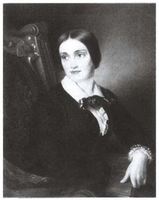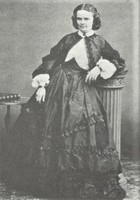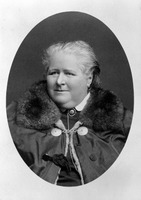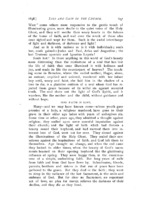"Old Maids," Woman's Voice and Public School Champion, Jan 25, 1896
Dublin Core
Title
"Old Maids," Woman's Voice and Public School Champion, Jan 25, 1896
Subject
Cushman, Charlotte Saunders, 1816-1876
Hosmer, Harriet Goodhue, 1830-1908
Gender Norms
Social Critique
Marriage
Criticism
Description
The article refers to an account of Frances Willard who was asked to provide information on famous "spinsters" or "old maids." The author adds to this list and refers to Willard's account as a "catalogue of famous spinsters."
The author, E.E. F., rejects the term "spinster":
"The term spinster is a ridiculous misnomer, for nobody spins now days [sic], and it is especially malapropos when applied to the self supporting women of these days, who have no time for even their needle, so exacting are the claims of their business or their profession."
The author instead proposed to "speak of the unmarried woman by the same term that is applied to her unmarried brother." However, "many people are inclined to regard it askance as savoring too much of that dreadful creature who apes mannish ways and mannish apparel, and forfeits the natural attractions of her sex for the sake of posing as an 'emancipated woman.'"
The author traces back the original meaning of bachelor to the Welsh bachgen, "meaning a youth of either sex." Praising "the brave, bright, independent woman who fills with a worthy pride her place among the world's workers," the author deems the linguistic expression less relevant and calls instead for a resignification of the societal status of single women.
The article mentions Charlotte Cushman, Harriet Hosmer Hosmer, and Frances Power Cobbe as examples.
It should be noted that Willard is herself called a famous spinster in Frances Albert Doughty's "Noted Bachelors and Spinsters" (1898).
Credit
Gale Digital Collections, Nineteenth Century Collections Online
The author, E.E. F., rejects the term "spinster":
"The term spinster is a ridiculous misnomer, for nobody spins now days [sic], and it is especially malapropos when applied to the self supporting women of these days, who have no time for even their needle, so exacting are the claims of their business or their profession."
The author instead proposed to "speak of the unmarried woman by the same term that is applied to her unmarried brother." However, "many people are inclined to regard it askance as savoring too much of that dreadful creature who apes mannish ways and mannish apparel, and forfeits the natural attractions of her sex for the sake of posing as an 'emancipated woman.'"
The author traces back the original meaning of bachelor to the Welsh bachgen, "meaning a youth of either sex." Praising "the brave, bright, independent woman who fills with a worthy pride her place among the world's workers," the author deems the linguistic expression less relevant and calls instead for a resignification of the societal status of single women.
The article mentions Charlotte Cushman, Harriet Hosmer Hosmer, and Frances Power Cobbe as examples.
It should be noted that Willard is herself called a famous spinster in Frances Albert Doughty's "Noted Bachelors and Spinsters" (1898).
Credit
Gale Digital Collections, Nineteenth Century Collections Online
Type
Reference
Article Item Type Metadata
Text
Miss Frances Willard was recently asked by a Southern gentleman who was getting up a lecture on "Old Maids" for the names of some of the most celebrated in this ancient and honorable fraternity. The list which she sent him headed by Florence Nightingale, is a long and brilliant one. Jean Ingelow, Christine Rossetti, Lucy Larcom, and Edith Thomas among poets; Rosa Bonheur among painters, and Harriet Hosmer among sculptors; Charles Egbert Craddock Octave Thanet, Mary Maples Didge, editor of St. Nicholas, Sarah Orne Jewett and Mary Wilkins among writers; and among preachers and reformers, Rev. Anna Shaw, SUsan B. Anthony, Anna Gordon and Elizabeth Greenwood;--these are names which though some famous ones of a former generation, Harriet Martineau, Jane Austin and Miss Edgeworth are omitted, make a roll of honor indeed.
Going back to Bible times she states it as her belief that Miriam was a spinster, and Dorcas and Pheobe, "else how could Dorcas have found time for the 'almsdeed that she did,' and how could Pheobe have gone to visit the church in Cenchrea." Mary and Martha were evidently unmarried, nor can the women saints of the Catholic church as described in Mrs Jamerson's glowing pages be passed by.
But neither St. Catherine nor St. Theresa, nor St. Anybody else, ever went on such an heoric pilgrimage as our Protestant Red Cross saint, Clara Barton, whose name in Miss Willard's list--she modestly leaves out her own--is followed by that of Dr. Emily Blackwell Dean of the Medical College in New York, the pioneer in woman's medical education.
"We have at least a hundred women lawyers who are unmarried, and thirty thousand women in the higher courses of education who belong to the sister-hood. There are more than three thousand women physicians in the United States, a majority of whom are undoubtedly unmarried."
Miss Willard mentions Miss Thomas of Bryn Mawr College, Miss Talbot, Dean of the Woman's Department of Chicago University and the Dean of Harvard Anney, in which list she might have included nearly all the faculty of Wellesley College. She has omitted the many women journalists living in single blessedness. By a slip of the memory doubtless, she fails to mention Dorothea Dix by the side of Clara Barton, or Amelia B. Edwards the famous Egyptologst, or Frederika Bremer with her lovely pictures of Swedish home life, or those sister song-birds, Alice and Pheobe Cary, or Gail Hamilton, or;--but the list would swell to mammoth proportions if everybody was admitted who had a right there. Miss Willard is quite excusable for not including "Dide, Zenobia, Joan of Arc, the Nine Muses, the Three Fates, or the uncanny Sybils," but why leave out in her catalogue of famous spinsters the unwedded Queen Elizabeth of England, who with all her faults was incomparably the greatest woman sovereign that ever swayed a sceptre. Oliver Cromwell who would certainly speak without prejudice, and who had hmself enough native kingliness to recognize in another that innate royalty which is independent of heredity, was right in always speaking of her as "that great Queen." He honored himself in doing it. It was the recognition that the gods give the gods. "But to come back to Miss Willard's list of our uncrowned queens;
"Mary Lyon, the pioneer educator of the century; Miss Alice Stone Blackwell of the Woman's Journal, Miss Jeanette Gilder of The Critic; Miss Kate Sanborn, litterateur; Miss Catherine Beecher, author; Francess Power Cobbe, the famous anti-vivisectionist; Ellice Hopkins, author of the White Cross Pledge; the three historians--Thalheimer, Strickland and Charlotte Yonge; Octavia Hill, the philantropist; Clementina Black, the reformer; Maria Mitchell, the astronomer, Charlotte Cushman, the actress; Anna Dickinson, the orator; Clara L. Kellogg and Emma Thursby, the singers; Mary Allen West, the editor; Phillipa Fawcett, "the more than Senior Wrangler," and last, but not least our own "Samantha" almost equally well-known as Marietta Holly, the most unique woman humorist of her own or any age."
She does not try to give a list of the "many unmarried women of England, France, Italy, Germany, Russia and Scandinavia," but mentions this interesting item that "a maiden lady, the Countess Ida Wedel-Jarisberg of Christiania, a maid of honor to the Queen, is president of the Scandinavia W. C. T. U."
To make herself worthy of training in such a company ought surely to furnish a field wide enough to exercise the ambition of any unmarried woman, or "old maid" if you please. The term spinster is a ridiculous misnomer, for nobody spins now days [sic], and it is especially malapropos when applied to the self supporting women of these days, who have no time for even their needle, so exacting are the claims of their business or their profession.
To speak of the unmarried woman by the same term that is applied to her unmarried brother is looked upon with much favor in some quarters, but this application of the word has not yet been naturalized, and many people are inclined to regard it askance as savoring too much of that dreadful creature who apes mannish ways and mannish apparel, and forfeits the natural attractions of her sex for the sake of posing as an "emancipated woman."
Yet there is good authority derived from ancient times for such a use of the word, for though it is of very obscure origin it may be traced back to the Welsh bachgen, meaning a youth of either sex. In fact this modern use of it is a very old one. Nor could it have been unknown to our English ancestors for Ben Jonson in one of his dramas, "The Magnetick Lady," applies it to the heroine as if it was a well-known and familiar expression for a single woman;--another proof that there is nothing new under the sun, not even a bachelor girl.
However, it makes very little difference to the brave, bright, independent woman who fills with a worthy pride her place among the world's workers, by what name said world chooses to designate her single estate. As the rose would lose none of its sweetness by being called something else, so the Frances Willards and Clara Bartons, with all the lesser stars, even to the faintest nebulae that go to make up the sister-hood, can never be anything but what they are; and sad indeed would it be for the world if they could.
Going back to Bible times she states it as her belief that Miriam was a spinster, and Dorcas and Pheobe, "else how could Dorcas have found time for the 'almsdeed that she did,' and how could Pheobe have gone to visit the church in Cenchrea." Mary and Martha were evidently unmarried, nor can the women saints of the Catholic church as described in Mrs Jamerson's glowing pages be passed by.
But neither St. Catherine nor St. Theresa, nor St. Anybody else, ever went on such an heoric pilgrimage as our Protestant Red Cross saint, Clara Barton, whose name in Miss Willard's list--she modestly leaves out her own--is followed by that of Dr. Emily Blackwell Dean of the Medical College in New York, the pioneer in woman's medical education.
"We have at least a hundred women lawyers who are unmarried, and thirty thousand women in the higher courses of education who belong to the sister-hood. There are more than three thousand women physicians in the United States, a majority of whom are undoubtedly unmarried."
Miss Willard mentions Miss Thomas of Bryn Mawr College, Miss Talbot, Dean of the Woman's Department of Chicago University and the Dean of Harvard Anney, in which list she might have included nearly all the faculty of Wellesley College. She has omitted the many women journalists living in single blessedness. By a slip of the memory doubtless, she fails to mention Dorothea Dix by the side of Clara Barton, or Amelia B. Edwards the famous Egyptologst, or Frederika Bremer with her lovely pictures of Swedish home life, or those sister song-birds, Alice and Pheobe Cary, or Gail Hamilton, or;--but the list would swell to mammoth proportions if everybody was admitted who had a right there. Miss Willard is quite excusable for not including "Dide, Zenobia, Joan of Arc, the Nine Muses, the Three Fates, or the uncanny Sybils," but why leave out in her catalogue of famous spinsters the unwedded Queen Elizabeth of England, who with all her faults was incomparably the greatest woman sovereign that ever swayed a sceptre. Oliver Cromwell who would certainly speak without prejudice, and who had hmself enough native kingliness to recognize in another that innate royalty which is independent of heredity, was right in always speaking of her as "that great Queen." He honored himself in doing it. It was the recognition that the gods give the gods. "But to come back to Miss Willard's list of our uncrowned queens;
"Mary Lyon, the pioneer educator of the century; Miss Alice Stone Blackwell of the Woman's Journal, Miss Jeanette Gilder of The Critic; Miss Kate Sanborn, litterateur; Miss Catherine Beecher, author; Francess Power Cobbe, the famous anti-vivisectionist; Ellice Hopkins, author of the White Cross Pledge; the three historians--Thalheimer, Strickland and Charlotte Yonge; Octavia Hill, the philantropist; Clementina Black, the reformer; Maria Mitchell, the astronomer, Charlotte Cushman, the actress; Anna Dickinson, the orator; Clara L. Kellogg and Emma Thursby, the singers; Mary Allen West, the editor; Phillipa Fawcett, "the more than Senior Wrangler," and last, but not least our own "Samantha" almost equally well-known as Marietta Holly, the most unique woman humorist of her own or any age."
She does not try to give a list of the "many unmarried women of England, France, Italy, Germany, Russia and Scandinavia," but mentions this interesting item that "a maiden lady, the Countess Ida Wedel-Jarisberg of Christiania, a maid of honor to the Queen, is president of the Scandinavia W. C. T. U."
To make herself worthy of training in such a company ought surely to furnish a field wide enough to exercise the ambition of any unmarried woman, or "old maid" if you please. The term spinster is a ridiculous misnomer, for nobody spins now days [sic], and it is especially malapropos when applied to the self supporting women of these days, who have no time for even their needle, so exacting are the claims of their business or their profession.
To speak of the unmarried woman by the same term that is applied to her unmarried brother is looked upon with much favor in some quarters, but this application of the word has not yet been naturalized, and many people are inclined to regard it askance as savoring too much of that dreadful creature who apes mannish ways and mannish apparel, and forfeits the natural attractions of her sex for the sake of posing as an "emancipated woman."
Yet there is good authority derived from ancient times for such a use of the word, for though it is of very obscure origin it may be traced back to the Welsh bachgen, meaning a youth of either sex. In fact this modern use of it is a very old one. Nor could it have been unknown to our English ancestors for Ben Jonson in one of his dramas, "The Magnetick Lady," applies it to the heroine as if it was a well-known and familiar expression for a single woman;--another proof that there is nothing new under the sun, not even a bachelor girl.
However, it makes very little difference to the brave, bright, independent woman who fills with a worthy pride her place among the world's workers, by what name said world chooses to designate her single estate. As the rose would lose none of its sweetness by being called something else, so the Frances Willards and Clara Bartons, with all the lesser stars, even to the faintest nebulae that go to make up the sister-hood, can never be anything but what they are; and sad indeed would it be for the world if they could.
Provenance
E. E. F. "Old Maids." Woman's Voice and Public School Champion, 25 Jan. 1896. Nineteenth Century Collections Online, http://tinyurl.galegroup.com/tinyurl/9w5Gy3. Accessed 3 May 2019.
Location
Bostoon, MA, US
Geocode (Latitude)
42.3602534
Geocode (Longitude)
-71.0582912
Social Bookmarking
Geolocation
Collection
Citation
“"Old Maids," Woman's Voice and Public School Champion, Jan 25, 1896,” Archival Gossip Collection, accessed April 20, 2024, https://www.archivalgossip.com/collection/items/show/669.





